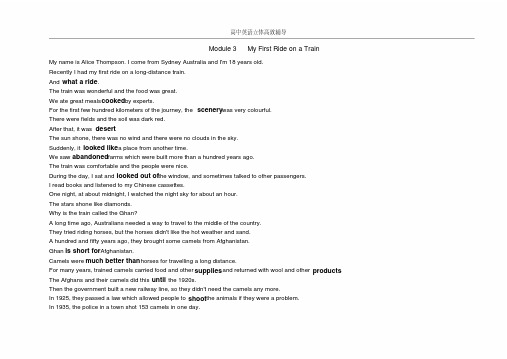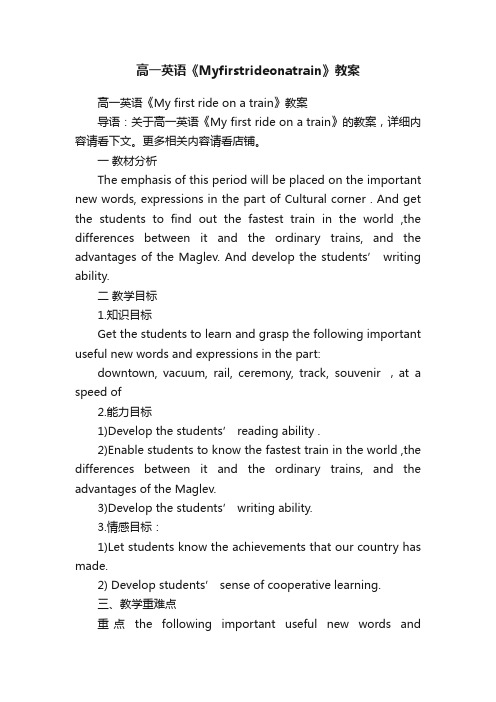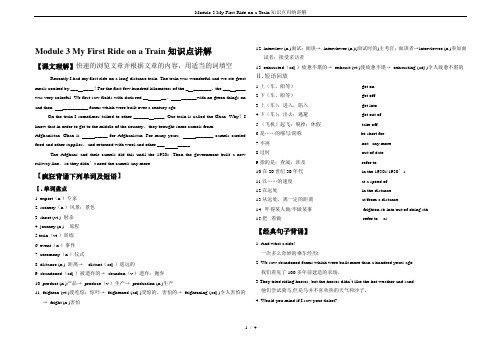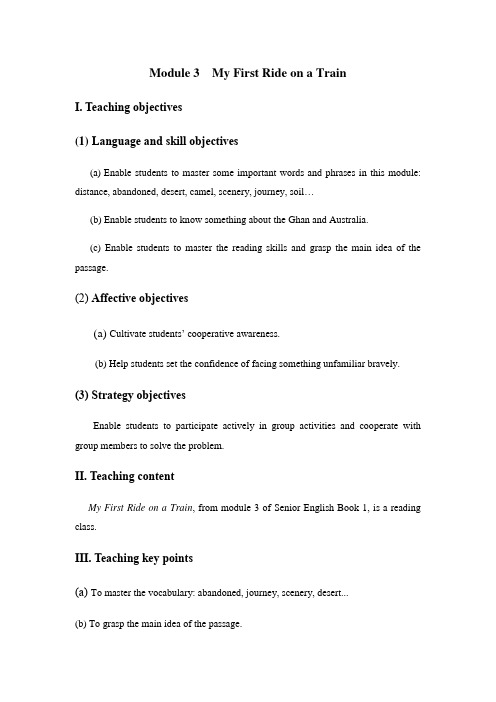高一英语Module3 My First Ride On ATrainreading课件(29张幻灯片)外研版必修1
外研版高中英语必修一Module3 My First Ride on a Train知识点精讲及练习(含答案)

外研版高中英语必修一Module3 My First Ride on a Train知识点精讲及练习【重点单词短语】match + A + to/with + B 把…和…搭配起来/调和起来e.g. match practice to theory 理论与实践相结合match one’s actions to one’s words【归纳拓展】match+ n. + in/ for + n. 在…与…匹敌,成为…的对手e.g. No one can match her in knowledge of classical music.match+ n. + against/ with+ n. 使…(和…)交手/比赛e.g. He matched his shooting skill against the expert’s.match+ n. 或 match + adv. (和…)调和、适合、与…相配e.g. Her clothes don’t match her age.Her fingerprints ________ (match) those _________ (find) at the scene of the crime.As a couple they are not very well _________ (match).辨析 match / suit/ fitMatch多指大小、色调、形状、性质等方面的搭配;suit多指合乎需要、口味、性格、条件、地位等;fit 多指尺寸、形状合适,引申为“吻合”“协调”。
That doesn’t match your temperament.No dish suits all tastes.My new evening dress fits me quite well.2. distance n.距离,远方,远处The faces of four famous American presidents on Mount Rushmore(拉什莫尔山)can be seen from a ____ of 60 miles.A. lengthB. distanceC. wayD. space【归纳拓展】in the distance 在远处;在远方at a distance 在稍远处keep one’s distance from 与…保持一定距离keep sb. at a distance 与…保持距离;不予某人接近distant adj. 远的;疏远的;稀疏的;冷淡的be distant towards sb. 对...冷淡be distant from 离… 远3.means n.方式,手段(单复数同形)e.g.There is no doubt that radio and television are important means of communication.There is no means of finding out what happened.【归纳拓展】1. by means of sth. 用…的办法e.g. The government helped the victims of the earthquake by every means.He climbed up the tree by means of a ladder.2.by no means 绝不,一点也不(置于句首时须倒装)e.g.By no means is this fight the end of out friendship.【及时训练】1.Every possible means ______ been tried, and we find only ______ this means can we do it we.A. have; inB. have; byC. has; inD. has; by2.For him ______ stage is just ______ means of making a living.A. a aB. the aC. the; theD. a; the4. refer to 提到,涉及;说起;参考,查阅;指的是 (referred, referred, referring)e.g We agreed never to refer to the matter again.我们一致同意再也不提这件事。
外研版高一英语课文翻译Module3,book1,MyFirstRideonaTrain(带要点)

Module 3 My First Ride on a TrainMy name is Alice Thompson. I come from Sydney Australia and I'm 18 years old.Recently I had my first ride on a long-distance train.And what a ride.The train was wonderful and the food was great.We ate great meals c ooked by experts.For the first few hundred kilometers of the journey, the scenery was very colourful.There were fields and the soil was dark red.After that, it was desert.The sun shone, there was no wind and there were no clouds in the sky.Suddenly, it looked like a place from another time.We saw abandoned farms which were built more than a hundred years ago.The train was comfortable and the people were nice.During the day, I sat and looked out of the window, and sometimes talked to other passengers.I read books and listened to my Chinese cassettes.One night, at about midnight, I watched the night sky for about an hour.The stars shone like diamonds.Why is the train called the Ghan?A long time ago, Australians needed a way to travel to the middle of the country.They tried riding horses, but the horses didn't like the hot weather and sand.A hundred and fifty years ago, they brought some camels from Afghanistan.Ghan is short for Afghanistan.Camels were much better than horses for travelling a long distance.For many years, trained camels carried food and other supplies, and returned with wool and other products. The Afghans and their camels did this until the 1920s.Then the government built a new railway line, so they didn't need the camels any more.In 1925, they passed a law which allowed people to shoot the animals if they were a problem.In 1935, the police in a town shot 153 camels in one day.我的首次火车之旅我是爱丽丝·汤普森。
1外研社高一英语必修一Module 3 My First Ride on a train教案

外研社高一英语必修一Module 3 My First Ride on a train Topic:My First Ride on a trainType:Reading1.Analysis of teaching material1.1.Status and functionsThe topic of this module is My First Ride on a Train,which can easily draw students’ attention and help them revise t he transport.The grammar point is the Past Tense that can be used when students describe their experiences.Therefore,this module is important,and it can help students talk about their trip they made to a tourist spot or other life experiences.2.Analysis of students2.1.Senior one students have learned the Past Tense before.2.2.They are able to talk about some simple topics and are curious about the foreigncountry.2.3.They can induce some language points themselves2.4.They are supposed to improve their reading skills.3.Teaching objectives3.1.After the lesson,students are able to understand these words on Page 22.3.2.Students can talk about their trip experiences using Past Tense3.3.Students are capable of talking about the general information aboutAustralia,and realizing the diversity of scenery and culture in different countries.4.Teaching methodsTask-based Language TeachingSituational Teaching Method5.Teaching key points and difficulties5.1.Key points5.1.1.The words on page 225.1.2.The usage of Past Tense5.1.3.Practice of reading skills5.1.4.How to talk about trip experience5.2.Difficulties5.2.1.Practice of reading skills5.2.2.How to talk about trip experience6.Teaching aidsMultimedia Blackboard7.Teaching progress7.1.Leading-inUse three questions which are related to students’ real trip experience to arous e students’ interest:Where did you go before?How did you get there?Did you enjoy it and why?T: Good morning, everyone.Today’s topic is travel,do you like it?S: Yes!We like it.T: So,boys and girls, have you ever been to someplace?Would you like to share something with us?Who wants to be the first one?Put up your hands,please.T: Yang Qing,please.Where did you go before?How did you get there?Did you enjoy it and why?S:……T:Wonderful experience,thank you!Now,please look at the sc reen,let’s revise these transportation words together,ok? First of all,tell me what’s this?S: 渡轮。
高一英语《Myfirstrideonatrain》教案

高一英语《Myfirstrideonatrain》教案高一英语《My first ride on a train》教案导语:关于高一英语《My first ride on a train》的教案,详细内容请看下文。
更多相关内容请看店铺。
一教材分析The emphasis of this period will be placed on the important new words, expressions in the part of Cultural corner . And get the students to find out the fastest train in the world ,the differences between it and the ordinary trains, and the advantages of the Maglev. And develop the students’ writing ability.二教学目标1.知识目标Get the students to learn and grasp the following important useful new words and expressions in the part:downtown, vacuum, rail, ceremony, track, souvenir ,at a speed of2.能力目标1)Develop the students’ reading ability .2)Enable students to know the fastest train in the world ,the differences between it and the ordinary trains, and the advantages of the Maglev.3)Develop the students’ writing ability.3.情感目标:1)Let students know the achievements that our country has made.2) Develop studen ts’ sense of cooperative learning.三、教学重难点重点the following important useful new words andexpressions in the part: downtown, vacuum, rail, ceremony, track, souvenir ,at a speed of难点 Understand the differences between the maglev and the ordinary trains, and the advantages of the Maglev. And the students’ writing .四、学情分析学生对磁悬浮列车不太熟悉。
外研版高中英语必修1课件-Module3 My First Ride on a Train

Ghan train Ghan is short for Afghanistan.
【读而后思】 What did the writer think of her first trip on the train? She enjoyed the trip very much and thought it great.
Module 3 My First Ride on a Train Introduction & Reading and Vocabulary
Ⅰ. 速记单词 1. 音意记忆。
helicopter
tram camel cassette diamond expert
shoot soil
journey
2. 形意记忆。 (1)distance(n. )距离→_d_is_t_a_n_t(adj. )遥远的 (2)abandoned(adj. )被遗弃的→_a_b_a_n_d_o_n_(vt. )丢弃; 遗弃 (3)desert (n. )沙漠→_d_e_s_e_rt_ (vt. )遗弃, 抛弃→_d_e_s_e_rt_e_d_(adj. )被抛 弃的, 荒废的 (4)_p_r_o_d_u_c_t(n. )产品→produce(vt. )生产→_p_r_o_d_u_c_t_io_n_(n. )生产; 制作 (5)_s_c_e_n_e_r_y (n. )风景; 景色→scene (n. )场景 (6)_t_r_a_in_ (vt. )训练→training (n. )培训
【归纳拓展】 in the distance at a distance at a distance of from a distance keep one’s distance from keep sb. at a distance
高中英语Module3MyFirstRideonaTrainSectionⅠIntroduction

高中英语Module3MyFirstRideonaTrainSectionⅠIntroduction&Re adingandVocabulary课后限时训练外研版必修Ⅰ.语境填词1.We were struck by the beauty of the West Lake,so we stopped to admire the beautiful scenery(风景).2.Children should be trained(训练)from an early age in table manners.3.Some experts(专家)think that language learning is much easier for children as their tongues are more flexible.4.Camels(骆驼)are much better than horses for travelling in the desert area. 5.The abandoned(被遗弃的)disabled children should be taken good care of by the whole society.6.The distance(距离)from the farm to the town is five kilometres.7.We need new products(产品)to sell.8.I didn't sleep until midnight(半夜)last night for drinking too much black coffee. 9.This summer I will make a long journey(旅行)from Beijing to Guangzhou. 10.The hunter shot(射击)at the eagle,but he missed it.Ⅱ.单句语法填空1.When you knew she was short of money at that time,why didn't you lend her some? 2.He watched the train leaving the station until it disappeared from sight.3.It was foolish of him to refer to his notes during the 2017 final examination,and as a result,he got punished.4.The factory has made more cars in recent days—there has been an increase in production(produce).5.—Have you heard the news that some photos of moon surface have been sent back from the lunar probe Chang'e3?—Yes.What encouraging news!Ⅲ.阅读理解Fifteen years ago,I took a summer vacation in Lecce in southern Italy.After climbing up a hill for a panoramic(全景的)view of the blue sea,white buildings and green olive trees,I paused to catch my breath and then positioned myself totake the best photo of this panorama.Unfortunately,just as I took out my camera,a woman approached from behind,and planted herself right in front of my view.Like me,this woman was here to stop,sigh and appreciate the view.Patient as I was,after about 15 minutes,my camera scanning the sun and reviewing the shot I would eventually take,I grew frustrated.Was it too much to ask her to move so I could take just one picture of the landscape?Sure,I could have asked her,but something prevented me from doing so.She seemed so content in her observation.I didn't want to mess with that.Another 15 minutes passed and I grew bored.The woman was still there.I decided to take the photo anyway.And now when I look at it,I think her presence in the photo is what makes the image interesting.The landscape,beautiful on its own,somehow comes to life and breathes because this woman is engaging with it.This photo,with the unique beauty that unfolded before me and that woman who “ruined” it,now hangs on a wall in my bedroom.What would she think if she knew that her figure is captured(捕捉)and frozen on some stranger's bedroom wall?A bedroom,after all,is a very private space,in which some woman I don't even know has been immortalized(使……永存).In some ways,she lives in my house.Perhaps we all live in each others' spaces.Perhaps this is what photos are for:to remind us that we all appreciate beauty,that we all share a common desire for pleasure,for connection,for something that is greater than us.That photo is a reminder,a captured moment,an unspoken conversation between two women,separated only by a thin square of glass.[文章大意] 本文是一篇记叙文。
Module-3-My-First-Ride-on-a-Train知识点归纳讲解

Module 3 My First Ride on a Train知识点讲解【课文理解】快速的浏览文章并根据文章的内容,用适当的词填空Recently I had my first ride on a long-distance train. The train was wonderful and we ate great meals cooked by ___ ____!For the first few hundred kilometers of the _ _______,the ___ ____ was very colorful. We first saw fields with dark red __ __,______with no green things on and then __________ farms which were built over a century ago.On the train I sometimes talked to other ______ ____. Our train is called the Ghan. Why?I know that in order to get to the middle of the country,they brought some camels from Afghanistan. Ghan is _____ for Afghanistan. For many years, _______ camels carried food and other supplies,and returned with wool and other ___ _____.The Afghans and their camels did this until the 1920s. Then the government built a new railway line,so they didn’t need the camels any more.【疯狂背诵下列单词及短语】Ⅰ.单词盘点1. expert(n.)专家2. scenery(n.)风景;景色3. shoot (vt.) 射杀4. journey (n.) 旅程5.train(vt.)训练6. event(n.)事件7. ceremony(n.)仪式8. distance (n.) 距离→distant(adj.)遥远的9. abandoned(adj.)被遗弃的→abandon(v.)遗弃;抛弃10. product (n.)产品→produce(v.)生产→production (n.)生产11. frighten (vt.)使吃惊;惊吓→frightened (adj.)受惊的,害怕的→frightening (adj.)令人害怕的→fright (n.)害怕12. interview (n.)面试;面谈→interviewer (n.)(面试时的)主考官;面谈者→interviewee (n.)参加面试者;接受采访者13. exhausted(adj.)疲惫不堪的→exhaust (vt.)使疲惫不堪→exhausting (adj.)令人疲惫不堪的Ⅱ.短语回放1.上(车、船等)get on2.下(车、船等)get off3.上(车);进入,陷入get into4.下(车);出去;逃避get out of5.(飞机)起飞;脱掉;休假take off6.是……的缩写/简称be short for7.不再not...any more8.过时out of date9.指的是;查阅;涉及refer to10.在20世纪30年代in the 1930s/1930’s11.以……的速度at a speed of12.在远处in the distance13.从远处,离一定的距离at/from a distance14. 吓得某人做/不做某事frighten sb.into/out of doing sth.15.把...看做refer to ...as【经典句子背诵】1. And what a ride!一次多么奇妙的乘车经历!2. We saw abandoned farms which were built more than a hundred years ago.我们看见了100多年前建造的农场。
高中英语Module 3 My First Ride on a Train 教案

Module 3 My First Ride on a TrainI. Teaching objectives(1)Language and skill objectives(a)Enable students to master some important words and phrases in this module: distance, abandoned, desert, camel, scenery, journey, soil…(b) Enable students to know something about the Ghan and Australia.(c) Enable students to master the reading skills and grasp the main idea of the passage.(2) Affective objectives(a) Cultivate students’ cooperative awareness.(b) Help students set the confidence of facing something unfamiliar bravely.(3) Strategy objectivesEnable students to participate actively in group activities and cooperate with group members to solve the problem.II. Teaching contentMy First Ride on a Train, from module 3 of Senior English Book 1, is a reading class.III. Teaching key points(a) To master the vocabulary: abandoned, journey, scenery, desert...(b) To grasp the main idea of the passage.IV. Teaching difficult pointEnable students to find the clues of the writer’s first ride on a train and to describe the trip experience in their life.VI. Teaching aidsa projector and a computer, blackboard, textbookVII. Teaching proceduresStep 1 GreetingT: Good afternoon, class!Ss: Good afternoon, teacher!Step 2 ReviewT: Last class, we learned some words. Today, let’s review them together. distance,abandoned,camel,desert,diamond,product,scenery,soil,journey(The teacher will present these words on the screen.)Step 3 Lead inT: What do you think the topic is according to the title?Ss: Trip and travel.T: Great! I will show you some pictures about my trip. Okay, last summer, I went to Langzhong with my friends. It’s an ancient town. We got there by train. The scenery was wonderful and we visited some places. Although we just stayed two days and one night, we had fun! So this was my trip and how about you?(The pictures are presented on the screen.)T: Look at the screen and discuss the questions with your partner.Q1: Have you ever travelled ?Q2: Where have you travelled? And why?Q3: Which transportation did you choose?(The teacher will invite two students to share their trips.)Step 4 Pre-readingT: Some students haven’t travelled before. Today I will take you to Australia to travel. Before travelling, we should know something about Australia.Q1. Do you know the name of the capital city?(Canberra)Q2. Where do you think most of the people live, in the central part of the country or on the coast?(On the east coast and the southeast coast)Q3. What Australian animals do you know about?(Kangaroo, koala bear)Step 5 Fast reading1.T: Read the passage quickly and then tell the main idea of the passage.(The teacher will present four possible answers on the screen and ask one student to answer)A. a train ride to SydneyB. taking the train to AustraliaC. travelling to the central part of AustraliaD. a child visiting her grandmotherS: The answer is C because the passage tells us Alice’s first trip to Alice Springs.2.T: Try to find out the main idea of each paragraph.Para 1: The scenery along the railwayPara 2: Why is the train called Ghan?Para 3: Things about the camelsPara 4: Things that I did on the trainPara 5: The fate of the camels nowadaysPara 6: I had my first ride on a long distance train Step 6 Read for details1.Read paragraph 1 and finish the task.Task: when, who, what, how, where(The teacher will ask one student to share answer.)2.Read paragraphs 2-3, and find the key words to fill in the blanks. Blanks: what did she see and what did she do (whole-class〕Step 7 SummaryThe teacher will lead students to summarize the passage.Step 8 HomeworkRead paragraph 4-6 carefully and think about the following questions.1. Why did Australians abandon the horses?2. What’s the advantages of camels?3. Why was the train called the Ghan?。
- 1、下载文档前请自行甄别文档内容的完整性,平台不提供额外的编辑、内容补充、找答案等附加服务。
- 2、"仅部分预览"的文档,不可在线预览部分如存在完整性等问题,可反馈申请退款(可完整预览的文档不适用该条件!)。
- 3、如文档侵犯您的权益,请联系客服反馈,我们会尽快为您处理(人工客服工作时间:9:00-18:30)。
disappeared in the distance. 2) The picture is good at first sight, but it looks better at a distance.
in the distance 在远处;在远方 at a distance 稍远处 (at/from) a distance of (在)„远的地方 keep sb at a distance与某人保持距离;不与某人亲近 distant adj. 遥远的;久远的;疏远的;冷淡的 be distant from…离„远
1.get on上(车、船等);进展,进行;相处 We got on in Sydney and we got off in Alice Springs, right in the middle of Australia, more than four thousand kilometers away.我们在悉尼上火车,在艾丽丝丝普
遗弃的农场,它们被建立于一百多年前。 (回归课本p 23 ) 原句点拨:本句中的abandoned 是过去分词作定语, 修饰farms,意为“被遗弃的。
abandon
vt. 放弃,遗弃,舍弃,中止
1.abandon sb/sth 抛弃(遗弃)某人/某物 2.abandon doing 放弃做某事 3.abandon oneself to…“ 沉溺于… ” (to是介词) =be addicted to… Eg: 1.We had to abandon the car and walk the rest of the way. 2.The baby had been abandoned by its mother. 3. She abandons herself to drinking.
1. distance n. 距离;远处;远方
Recently I had my first ride on a long distance train.
最近我第一次乘坐了长途火车。(回归课本 P23)
观察思考 猜测distance短语的意义:
1) He stood there, watching until the train
Module 3
Reading and Vocabulary
Yesterday once more
radio When I was young ,I'd listen to the 1_______ 2 __________for my 3_____________songs Waiting favourite When they played I'd 4________ along, sing It made me 5__________. smile Those were such happy times 6________ and not so long 7_____ ago How I 8___________ wondered where they'd gone. But they're back again just like a long lost friend 9________ All the songs I love so well.
Along the road we could see nothing but _____clothes and furniture B which were too heavy for the villagers to carry.
A. abandoning B. abandoned
C. abandon D. to abandon
2.Scenery n. 风景;景色
For the first few hundred kilometers of the journey, the scenery was very colorful.
在旅行的前几百公里,景色非常迷人。 (回归课本p 23)
scenery,scene,view,sight
用scenery sights scene view的适当形式填空
① Guilin attracts lots of visitors by its beautiful
natural scenery
.
②There is a fine viewof the mountain from our
hotel window.
(1)scenery是[u] ,是自然景色的总称,常用来描述静态的
美丽的乡村景色,指“一地区的自然景色,风景”。
(2) Scene 指电影,书,图画中的场景,场面侧重于有人 活动的场面.
[c]
(3)view是[c] ,1)指从某一位置(窗口,山顶„)看到的景观 。 2) 还可表示“观点,看法”。 (4)sight既可以指场景、眼前看到的景观,又可以指名胜、 风景,表示后者的含义时是[c] ,必须要用复数形式。
③The Great Wall is one of the sights of China.
④The boats in the harbour make a
beautiful scene .
3. abandoned adj.被遗弃的,被抛弃的;
无约束的
We saw abandoned farms which were built more than a hundred years ago. 我们看到了被
1.When we saw lights _______________ in the distance (远方),we quickened our pace. 2.The face of four famous American presidents on Mount from a distance of 60miles 从 Rushmore can be seen___________________________( 60英里的距离) 3) Tom always __________________________. keeps Jack at a distance 汤姆总是与杰克保持距பைடு நூலகம்。
